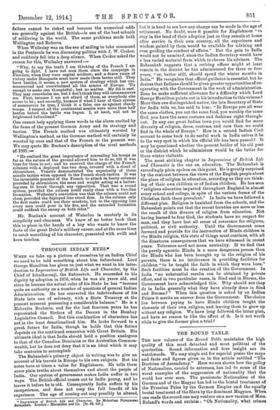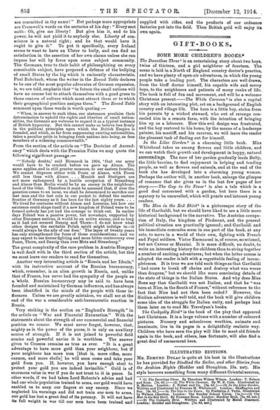THE ROUND TABLE.
Tun new volume of the Round Table maintains the high quality of this most detached and most political of the quarterlies. Sound information and true insight are its watchwords. We may single out for especial praise the maps and facts and figures given us in the article entitled "The Doctrine of Ascendancy." Here we are shown how the policy of Nationalism, carried to extremes, has led to some of the worst examples of the suppression of nationality that the world has ever seen. The passionate Nationalism of the German and of the Magyar has led to the brutal treatment of the Prussian Poles by the German Empire and the equally brutal treatment of the Slays by the dominant Magyars. When one reads the record one May venture on a new version of Mme. Roland's words and exclaim : " Oh Nationality, wlat crimes
are committed in thy name! " But perhaps more appropriate are Cromwell's words ou the sectaries of his day: " Every sect saith : Oh, give me liberty! But give him it, and to his power, be will not yield it to anybody else. Liberty of con- science is a natural right ; and he that would have it ought to give it." To put it specifically, every Ireland seems to want to have an Ulster to bully, and can find no satisfaction in the assertion of her own claims unless she can impose her will by force upon some subject community. The Germans, true to their habit of philosophizing on every
conceivable subject, have prepared a defence of the bullying of small States by the big which is eminently characteristic. Paul Rohrbach, whom the writer in the Round Table declares to be one of the most popular advocates of German expansion, is, we are told, emphatic that "in future the small nations will
have no course but to attach themselves with a good grace to those centres of culture which most attract them or to which
their geographical position assigns them." The Round Table comment upon these words is worth quoting :- " When, in answer to such ideas, our statesmen proclaim their determination to uphold the rights and liberties of small nation- alities, the Germans are welcome to regard it as a typical instance of British hypocrisy. But this cannot make us believe less firmly in the political principles upon which the British Empire is founded, and which, so far from suppressing existing nationalities, takes a peculiar pride in bringing fresh nations into being, as free members of a widening commonwealth."
From the section of the article on "The Doctrine of Ascend- ancy" which deals with the Prussian Poles we may quote the following significant passage ;— "` Nobody doubts,' said Bismarck in 1894, 'that our army would have to he crushed before we gave up Alsace. The same applies, and in still greater measure, to our eastern frontier, We cannot dispense either with Posen or Alsace, with Posen still less than with Alsace. . . Munich and Stuttgart are not more endangered by a hostile occupation of Strassburg and Alsace than Berlin would be by an enemy in the neighbour- hood of the Oder. Therefore it must be assumed that, if ever the question comes to an issue, we shall be determined to sacrifice our last man and the last coin in our pocket to defend the eastern frontier of Germany as it has been for the last eighty years. . . . We lived for centuries without Alsace and Lorraine, but how our existence could shape itself if a new kingdom of Poland were to be formed nobody has yet had the courage to think out. In earlier days Poland was a passive power, but nowadays, supported by other European nations, it would be an active enemy, and so long as it bad not secured Danzig and Thorn—I do not know what other designs the excitable Polish spirit might indulge in—it would always be the ally of our foes.' The lapse of twenty years has only strengthened the force of these considerations : and we may expect to see fiercer fighting and more bitter controversy over Posen, Thorn, and Danzig than over Metz and Strassburg."
The great complexity of the race problem in Austria-Hungary
is well dealt with in the third section of the article, but this we must leave our readers to read for themselves.
Another very interesting article is "Russia and her Ideals," with its instructive account of the Russian bureaucracy,
which, remember, is an alien growth in Russia, and, unlike that of France, has never had the sympathy of the people as a o7liole. Russian bureaucracy may be said to have been founded and maintained by German influences, and has always been identified in the minds of the people with those in- fluences. Unless we are greatly mistaken, we shall see at the end of the war a considerable anti-bureaucratic reaction in Russia.
Very striking is the section on " England's Strength " in the article on " War and Financial Exhaustion." With the statements about the strength of our commercial and financial position we concur. We must never forget, however, that, mighty as is the power of the purse, it is only an auxiliary source of strength. If it is not joined to powerful field armies and powerful navies it is worthless. The answer given to Croesus remains as true as ever. "It is a great advantage to have more gold than your neighbour, but if your neighbour has more iron [that is, more rifles, more cannon, and more shells] he will soon come and take your gold from you. If, however, you have enough steel to protect your gold you are indeed invincible." Gold is of enormous value in war if you do not trust to it in peace. In other words, if we had taken Lord Roberts's advice and had had our whole population trained to arms, our gold would have enabled us to snap our fingers at any enemy. Since we neglected his warnings and did not train our men to arms, our gold has lost a great deal of its potency. It will not have ita full weight in war till our men have been trained and
supplied with rifles, and the products of our ordnance factories put into the field. Then British gold will enjoy ita own again.















































 Previous page
Previous page